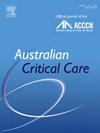Sealing efficiency and safety of a polyurethane-based fecal management system in intensive care—Results from a real-world study
IF 2.7
3区 医学
Q2 CRITICAL CARE MEDICINE
引用次数: 0
Abstract
Objective
Fecal management systems (FMSs) are critical for preventing skin irritations and anal dermatitis in intensive care. A polyurethane-based system (hygh-tec® [Advanced Medical Balloons]) has been introduced in the European Union and United States. This real-world observational study aimed to evaluate the sealing efficiency and safety of the system in routine care.
Methods
Thirty-nine patients were included in the descriptive analysis (18 females and 21 males; mean age: 66.4 ± 10.5 years; body mass index: 28.8 ± 11.7 kg/m2). Intensive care nurses documented findings related to sealing efficiency, anal lesions, and adverse events during their shifts.
Results
Sealing efficiency was assessed from 1110 shift reports. The mean device usage duration was 10.8 days (range: 3–31 days). No visible perianal contamination was noted in 76.0% of shift reports (n = 844). Relevant leakage was documented in 10.7% of cases and was independent of body mass index, anal sphincter muscle tone, and reason for admission. Stool consistency and patient vigilance had minimal influence. There were no device-related adverse events, and the incidence of anal lesions was 0.8% over 31 days of use.
Conclusion
The polyurethane-based FMS demonstrated excellent sealing efficiency, tolerability, and safety. Controlled studies are needed to confirm these findings and evaluate economic implications. FMSs can improve both work quality and patient safety.
密封效率和安全性聚氨酯为基础的粪便管理系统在重症监护-结果来自现实世界的研究
目的在重症监护中,粪便管理系统(FMSs)是预防皮肤刺激和肛门皮炎的关键。基于聚氨酯的系统(high -tec®[先进医疗气球])已在欧盟和美国推出。这项现实世界的观察性研究旨在评估该系统在常规护理中的密封效率和安全性。方法39例患者进行描述性分析,其中女性18例,男性21例;平均年龄:66.4±10.5岁;身体质量指数:28.8±11.7 kg/m2)。重症监护护士在轮班期间记录了与密封效率、肛门病变和不良事件相关的发现。结果从1110份轮班报告中评估了密封效率。平均设备使用时间为10.8天(范围3 ~ 31天)。76.0%的轮班报告(n = 844)未发现明显的肛周污染。10.7%的病例出现相关渗漏,与体重指数、肛门括约肌张力和入院原因无关。粪便一致性和患者警惕性的影响最小。没有器械相关的不良事件,使用31天肛门病变的发生率为0.8%。结论聚氨酯基FMS具有良好的密封效果、耐受性和安全性。需要对照研究来证实这些发现并评估其经济影响。FMSs可以提高工作质量和患者安全。
本文章由计算机程序翻译,如有差异,请以英文原文为准。
求助全文
约1分钟内获得全文
求助全文
来源期刊

Australian Critical Care
NURSING-NURSING
CiteScore
4.90
自引率
9.10%
发文量
148
审稿时长
>12 weeks
期刊介绍:
Australian Critical Care is the official journal of the Australian College of Critical Care Nurses (ACCCN). It is a bi-monthly peer-reviewed journal, providing clinically relevant research, reviews and articles of interest to the critical care community. Australian Critical Care publishes peer-reviewed scholarly papers that report research findings, research-based reviews, discussion papers and commentaries which are of interest to an international readership of critical care practitioners, educators, administrators and researchers. Interprofessional articles are welcomed.
 求助内容:
求助内容: 应助结果提醒方式:
应助结果提醒方式:


